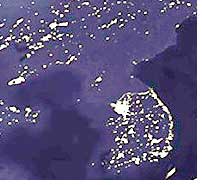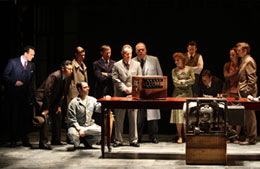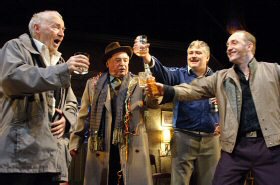“Solitude would be an ideal state if one were able to pick the people one avoids.”
Karl Kraus, Beim Word genommen (trans. Harry Zohn)
Archives for 2007
TT: Never a dull moment
 I dropped Mrs. T off at the Milwaukee train station a couple of hours ago, then checked my voice mail as I drove to the airport and found out that I had become the Flavor of the Day.
I dropped Mrs. T off at the Milwaukee train station a couple of hours ago, then checked my voice mail as I drove to the airport and found out that I had become the Flavor of the Day.
It seems that the New York Philharmonic has definitely decided to perform in North Korea next February, and that the New York Times ran a story this morning in which mention was made of “Serenading a Tyrant,” the Wall Street Journal column I wrote in October arguing that this would be a mistake:
Some questions have been raised about the appropriateness of visiting a country run by one of the world’s most repressive governments. North Korea’s policies have been blamed in part for the famine-related starvation of perhaps two million people and it confines hundreds of thousands of people in labor camps.
If the orchestra goes to Pyongyang, “it will be doing little more than participating in a puppet show whose purpose is to lend legitimacy to a despicable regime,” Terry Teachout, an arts critic and blogger, wrote on the online opinion pages of The Wall Street Journal in late October.
Once I got to the airport and checked my e-mail and voice mail, I found a half-dozen increasingly urgent messages from a CNN producer who wanted to know if I could appear on The Situation Room this afternoon to talk about the Philharmonic’s planned Pyongyang debut. Alas, it turned out that my flight from Milwaukee to New York had been delayed, so I e-mailed the producer to let her know that I’d be spending the next few hours cooling my heels in a departure lounge. She promptly called me on my cell phone to ask if I’d be willing to do a phone interview instead. Impressed by her persistence, I agreed, went through the security line, made my way to Gate 41, set up shop at a table in a nearby food kiosk, and turned my phone back on. Then I booted up my MacBook, plugged back into the Web, and read an e-mail from a BBC producer wanting to know if I’d do a phoner on the same subject.
 As I waited to hear from CNN, I noticed that airports are very noisy places. Had I been giving a performance of John Cage’s 4′33″ instead of a phone interview, it would have consisted of the following overheard sounds:
As I waited to hear from CNN, I noticed that airports are very noisy places. Had I been giving a performance of John Cage’s 4′33″ instead of a phone interview, it would have consisted of the following overheard sounds:
• Get-on-the-plane announcements
• In-the-interests-of-security announcements
• A pair of waitresses discussing their love lives in tones loud enough to shatter glass
• A tableful of men discussing their love lives over pizza
• A wide-ranging medley of kitchen-related noises
• Canned music (Milwaukee favors smooth jazz)
I fired off a e-mail to CNN warning the producer that she might have to do a bit of editing, and she wrote back to reassure me that all would be well. Five minutes later my cell phone rang, and a minute later we were off and running. A correspondent asked me five or six perfectly logical questions, all of which I answered in the manner to which my Wall Street Journal column had accustomed her. Then I e-mailed the producer a photo of myself sitting at a piano, and she told me that the segment would air at five p.m. Eastern. Needless to say, I won’t be seeing it–I’ll be somewhere over Pennsylvania, I hope–but you’re more than welcome to tune in and hear what I had to say.
No sooner did I finish with CNN than I heard back from the BBC producer, who asked me to sit tight while she lined up an interviewer. Ten minutes later I was talking to London.
“Where are you speaking from?” the interviewer asked.
“The airport in Milwaukee,” I replied. “I came out here to review an Alan Ayckbourn play.” (I figured that would boggle him.)
“And what’s the weather like?” he asked, imperturbable to a fault.
“Cold.”
Now I have two hours (I hope!) to kill in a strange airport. How shall I spend them? I could start writing about Lincoln Center Theater’s production of Cymbeline for my Friday Wall Street Journal drama column, put in a bit of work on my Louis Armstrong biography, catch up on my e-mail, or grab some lunch.
Such is a day in the life of a traveling opinionmonger in postmodern America.
TT: Under separate cover
Mrs. T and I are both traveling today, I in a plane and she on a train.
 The two of us flew to Wisconsin on Saturday morning to see the Milwaukee Repertory Theater‘s production of Alan Ayckbourn’s The Norman Conquests, three free-standing full-length plays that share the same characters and take place during the same span of time but are set in different rooms of the same house. For obvious reasons, The Norman Conquests is rarely revived, and this is one of the few major-house stagings to be presented in America since the trilogy was produced on Broadway in the winter of 1975-76. Seeing as how I’ve become America’s Drama Critic faute de mieux, I clearly had to review it, and the fact that I’m an adult convert to Ayckbourn’s cause made the assignment all the more urgent.
The two of us flew to Wisconsin on Saturday morning to see the Milwaukee Repertory Theater‘s production of Alan Ayckbourn’s The Norman Conquests, three free-standing full-length plays that share the same characters and take place during the same span of time but are set in different rooms of the same house. For obvious reasons, The Norman Conquests is rarely revived, and this is one of the few major-house stagings to be presented in America since the trilogy was produced on Broadway in the winter of 1975-76. Seeing as how I’ve become America’s Drama Critic faute de mieux, I clearly had to review it, and the fact that I’m an adult convert to Ayckbourn’s cause made the assignment all the more urgent.
I had another reason for wanting to go, which is that The Norman Conquests was the first Broadway show I ever saw. Moreover, I saw it–or rather, to be exact, one installment of it–on my very first trip to New York, about which I wrote in City Limits, the memoir I published in 1991:
New York, of course, isn’t exactly full of people trying to get to Smalltown, U.S.A., in a hurry, and people from Smalltown aren’t much more likely to go to New York, whether for a visit or for good. My father is a rare exception to this rule, for he went to a hardware convention in New York in 1964, returning with a reel of fuzzy home movies of the World’s Fair, a plastic Statue of Liberty, and a commitment to never going back about which he has yet to change his mind. I listened to his tales of squalor and rudeness, but the home movies made a deeper impression on me, and I followed in his reluctant footsteps at the age of nineteen. My school, a Southern Baptist college just outside of Kansas City, sponsored a week-long expedition to New York every year, and I signed up as soon as I was eligible. It was a busy week. I haunted the museums. I went to the Metropolitan Opera. I saw my first Nutcracker. But my biggest adventure consisted of going by myself to the early show at the Café Carlyle, neatly dressed in a black suit that my mother and I had picked out at a factory outlet store…
You can read all about my visit to the Carlyle in City Limits, but you can’t read anything about The Norman Conquests, for the simple reason that by the time I wrote City Limits I didn’t remember anything about it. I don’t even know which installment I saw. My first trip to New York had filled my head with so many memories that some of them inevitably got crowded out, and the complicated plot of The Norman Conquests was among the first to go. The only thing of which I’m sure was that I sat on the front row of the Morosco Theatre, which was torn down in 1982 to make way for the mammoth hotel-and-theater complex where The Drowsy Chaperone is now playing. I do remember being surprised by how small the theater seemed–it held a thousand people–and how close I was to Dick Benjamin and Paula Prentiss, whom I knew and loved from a short-lived but wonderful sitcom called He & She that was, alas, a few years ahead of its time.
It was the nearest I’d been to anyone famous, and I topped it a couple of nights later when I sat directly behind Lauren Bacall at an American Ballet Theatre program on which the young Mikhail Baryshnikov danced Spectre of the Rose, an experience that left me permanently star-struck. Small wonder that I moved to New York a decade later, though it never occurred to me that I’d end up becoming the drama critic of The Wall Street Journal. Back then I thought I was going to be…what? I wasn’t yet sure, but the idea of playing jazz for a living was already starting to take shape in my mind.
Last week I went to the opening night of Aaron Sorkin’s The Farnsworth Invention with a friend who (unlike me) has a knack for picking celebrities out of a crowd. The funny part is that my friend is herself a medium-gauge celebrity, but since she comes, as I do, from unspectacular circumstances, she isn’t even slightly blasé about living in New York, and takes the greatest pleasure out of spotting familiar faces.
“Who’s here?” I asked her.
She turned around in her seat and scanned the auditorium. “Ah, there’s Mike Nichols three rows behind you–no, he’s across the aisle. And that’s Phil Donahue and Marlo Thomas. And over there…Steven Spielberg and Tony Kushner!”
I was duly impressed–but not nearly so much as I was in 1975.
 Mrs. T and I have been holed up in Milwaukee’s InterContinental Hotel, which happens, amazingly enough, to be in the same building as the theater–a great convenience when the temperature outside is well below freezing. You can see a skating rink from the window of our ninth-floor room, which is directly across the street from City Hall, a century-old building of superbly old-fashioned splendor that is now swathed in scaffolding as part of a complete restoration. The hotel itself has changed hands and been redecorated since my last visit. Our room is both very modern and very comfortable, the staff is attentive and friendly in the Midwestern manner, and the food is excellent. We’ll come again.
Mrs. T and I have been holed up in Milwaukee’s InterContinental Hotel, which happens, amazingly enough, to be in the same building as the theater–a great convenience when the temperature outside is well below freezing. You can see a skating rink from the window of our ninth-floor room, which is directly across the street from City Hall, a century-old building of superbly old-fashioned splendor that is now swathed in scaffolding as part of a complete restoration. The hotel itself has changed hands and been redecorated since my last visit. Our room is both very modern and very comfortable, the staff is attentive and friendly in the Midwestern manner, and the food is excellent. We’ll come again.
I head back to New York today, but Mrs. T is going in a different direction. By the time you read these words, I’ll have dropped her off at the Milwaukee train station, from which she will travel to St. Louis by way of Chicago, and from there by shuttle bus to Smalltown, U.S.A. My mother, who fell and broke her pelvis last month, is being discharged later today from the rehab center where she spent the past couple of weeks learning how to walk again. Hilary and I had originally planned to fly out to Smalltown on December 20 to celebrate Christmas, but when my mother had her accident, Hilary unhesitatingly offered to go there a week and a half early to take care of her. Hence we’re going our separate ways this morning, to be reunited in Smalltown ten days from now.
It’s strange to think of Mrs. T being in Smalltown without me. We flew there last November on a meet-the-family mission, but we were only able to take a few days off, just long enough for her to show her face and make a (highly favorable) impression. Now she’ll be sleeping in the room where I slept when I was a boy, looking through the surviving souvenirs of my youth and drawing whatever conclusions she cares to draw about myself when young. If she wants, she can even snuggle up with Russell and Louise, the stuffed cats that were the treasured companions of my childhood, though I’m afraid she’ll find them a bit grubby.
I wish I were there with her, but I’m glad that she’s going to have a chance to spend time on her own with my mother, brother, and sister-in-law. As for me, I have two more shows to see and a half-dozen pieces to write before I can turn back around and fly home again. Is home the place where I come from, or the place where Mrs. T is? In ten days I won’t have to choose.
TT: Almanac
“In general, by an odd quirk of nature, the more fond of people I become, the more amusing I tend to find them. Love affairs in my life are matters of considerable hilarity. Necessarily, this has strictly curtailed not only my close circle of friends but my choice of female companions. Few women care to be laughed at and men not at all, except for large sums of money.”
Alan Ayckbourn, preface to The Norman Conquests
TT: An all-American bookshelf
Kalima, a United Arab Emirates-based non-profit venture, has just announced plans to translate a very wide-ranging list of foreign books into Arabic and distribute them throughout the Middle East. The inspiration for this idealistic enterprise was a UN report about human development in the Arab world which pointed out that more books are translated into Spanish every year than were translated into Arabic in the whole of the last millennium–an extraordinary and disturbing statistic.
Learning about Kalima inspired me to draw up my own list, a compact boxful of books that I’d send to an Arab (or any other foreigner) who wanted to know what America and its people were like. The list, not surprisingly, became the subject of this week’s “Sightings” column.
Which books did I pick? Here’s a hint: Willa Cather made the cut. To find out more, pick up a copy of Saturday’s Wall Street Journal and turn to my “Sightings” column in the Weekend Journal section.
UPDATE: To read the whole thing, go here.
CAAF: Brave new world
Well, Ms. Maud, I’ll see your Angela Carter on gentrification and raise you some Donna Tartt on McMansions.
In a hair-raising scene early in The Little Friend, young Harriet and her friend Hely are attempting to capture a poisonous snake. Their hunt for copperheads takes them to Oak Lawn Estates, a newer subdivision of their Mississippi town where all the houses “are less than seven years old: mock Tudor, blocky ranch and contemporary, even a couple of fake antebellums of new, spanking-red brick, with ornamental columns tacked on to their facades.” To make way for these outsize, expensive homes, the ground has been razed and plucked of all trees:
But Oak Lawn had taken its own revenge at being planed so brutally flat. The land was swampy, and whining with mosquitos. Holes filled with brackish water as soon as they were dug in the ground. The sewage backed up when it rained–legendary black sludge that rose in the spanking-new commodes, dripped from the faucets and the fancy multiple-spray showerheads. With all the topsoil sliced away, truckloads and truckloads of sand had to be brought in to keep the houses from washing away in the spring: and there was nothing to stop turtles and snakes from crawling as far inland from the river as they pleased.
And Oak Lawn Estates was infested with snakes–big and small, poisonous or not, snakes that liked mud, and snakes that liked water, and snakes that liked to bask on dry rocks in the sunshine. On hot days, the reek of snake rose up from the very ground, just as murky water rose to fill footprints in the bulldozed earth. Ida Rhew compared he smell of snake musk to fish guts–buffalo carp, mud or channel cat, scavenger fish that fed off garbage. Edie, when digging a hole for an azalea or a rosebush, particularly in Garden Club civic plantings near the Interstate, said she knew her spade was close to a snake’s nest if she caught a whiff of something like rotten potatoes.
CAAF: Afternoon coffee
If you’re a Project Runway fan, you’ll want to check out Jay McCarroll’s recaps of the show for Elle:
• Episode 1
• Episode 2
• Episode 3
• Episode 4
The recaps are wonderful — very, very funny about the show’s hoop-de-do (my favorite line: “Marion always looks shipwrecked.”) but also smart and constructive about breaking down the fashion going down the runway. The best thing since the launch of Project Rungay.
TT: Broadway’s back
I’ve basically been doing nothing but going to Broadway shows (and Sweeney Todd) and writing about them for the past few days. Today’s Wall Street Journal drama column contains the first fruits of my recent theatrical labors. In it I review four shows, three of them new plays that opened on Broadway this week: Aaron Sorkin’s The Farnsworth Invention, Tracy Letts’ August: Osage County, Conor McPherson’s The Seafarer, and a new off-Broadway musical called West Bank, UK. Here’s a preview of the column.
* * *
 While “The Farnsworth Invention” is as slick as “Studio 60 on the Sunset Strip,” it’s also impressively earnest, and its subject is the less-than-burning question of Who Really Invented TV. And you know what? It’s good. Not great, you understand, but a rock-solid two-base hit.
While “The Farnsworth Invention” is as slick as “Studio 60 on the Sunset Strip,” it’s also impressively earnest, and its subject is the less-than-burning question of Who Really Invented TV. And you know what? It’s good. Not great, you understand, but a rock-solid two-base hit.
The Farnsworth of the title is Philo T. Farnsworth (Jimmi Simpson), a small-town science geek who more or less invented electronic TV in his garage, thus running afoul of David Sarnoff (Hank Azaria), the CEO of RCA, whose scientists had been trying without success to do the same thing. Sarnoff thereupon unleashed a pack of high-priced lawyers on Farnsworth in an attempt to seize control of the patents that protected his invention. That sounds suspiciously like a courtroom drama, but instead Mr. Sorkin has written a clever history pageant that juxtaposes Farnsworth’s dogged experiments with Sarnoff’s meteoric rise through the ranks of corporate America, in the process stuffing a stiff dose of interesting information about the early days of radio and TV down the audience’s collective gullet.
Farnsworth and Sarnoff tell one another’s stories in “The Farnsworth Invention,” an ingenious conceit that keeps the action ping-ponging back and forth between the two characters. Mr. Azaria plays Sarnoff as a tightly coiled tough guy with a sandpaper voice, while Mr. Simpson’s Farnsworth is engagingly and believably sincere. Des McAnuff’s staging roars along like a high-speed tank, and the other 17 members of the cast, all of whom play multiple roles, put personal spins on even the smallest parts….
The Steppenwolf Theatre Company is performing Tracy Letts’ “August: Osage County” on Broadway. Mr. Letts’ new play is a 13-character, three-and-a-half-hour monster about the Westons, an Oklahoma family so dysfunctional that it’s a wonder they’re not all dead. Repeat after me: adultery, alcoholism, drug addiction, incest. One of them is even a poet!
No doubt it sounds like Tennessee Williams on a bender, but what makes “August: Osage County” so excitingly watchable is that Mr. Letts has (mostly) chosen to play these grim matters for laughs. The horrific family dinner at which Mom Weston (Deanna Dunagan) pops a double handful of downers and starts settling scores is a glittering piece of black comedy, and the cast, consummately well directed by Anna D. Shapiro, plays it to perfection….
 Conor McPherson has given us a Christmas show for the suicidally depressed. “The Seafarer” is one of those capital-I Irish plays whose characters, one of whom (Ciarán Hinds) turns out to be the Divvil Himself, get falling-down drunk, hint broadly that there’s more to life than death and spout four- and seven-letter words starting with “f” in rich, peaty brogues. It is also–no fooling–worthy of comparison with the finest work of the young Brian Friel.
Conor McPherson has given us a Christmas show for the suicidally depressed. “The Seafarer” is one of those capital-I Irish plays whose characters, one of whom (Ciarán Hinds) turns out to be the Divvil Himself, get falling-down drunk, hint broadly that there’s more to life than death and spout four- and seven-letter words starting with “f” in rich, peaty brogues. It is also–no fooling–worthy of comparison with the finest work of the young Brian Friel.
Strong words, I know, but the 36-year-old Mr. McPherson has earned them. Like Mr. Letts, he’s written a midnight-black comedy, one that wrenches laughter out of the despair of frustrated men whose lives have come to naught….
Oren Safdie (“Private Jokes, Public Places”) and songwriter Ronnie Cohen have given the “Avenue Q” treatment to the Israeli-Palestinian conflict in “West Bank, UK,” a caustically witty four-person musical with a Middle Eastern-flavored score that succeeds in wringing hard-nosed fun out of deadly serious matters. You were expecting maybe a comic duet sung by a pair of suicide bombers? Well, that’s what you get–and it works…
* * *
To read the whole thing, go here.
